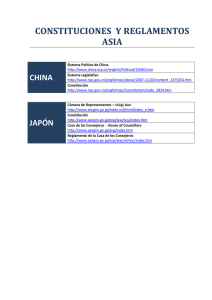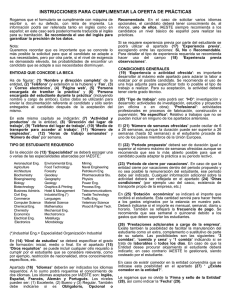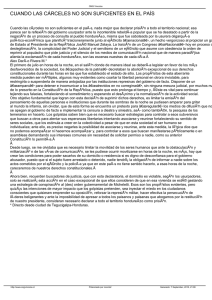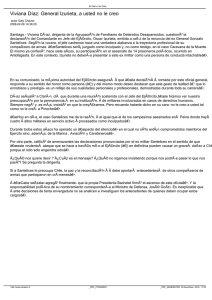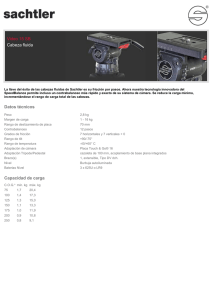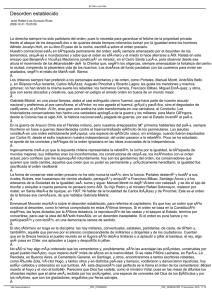Here
Anuncio
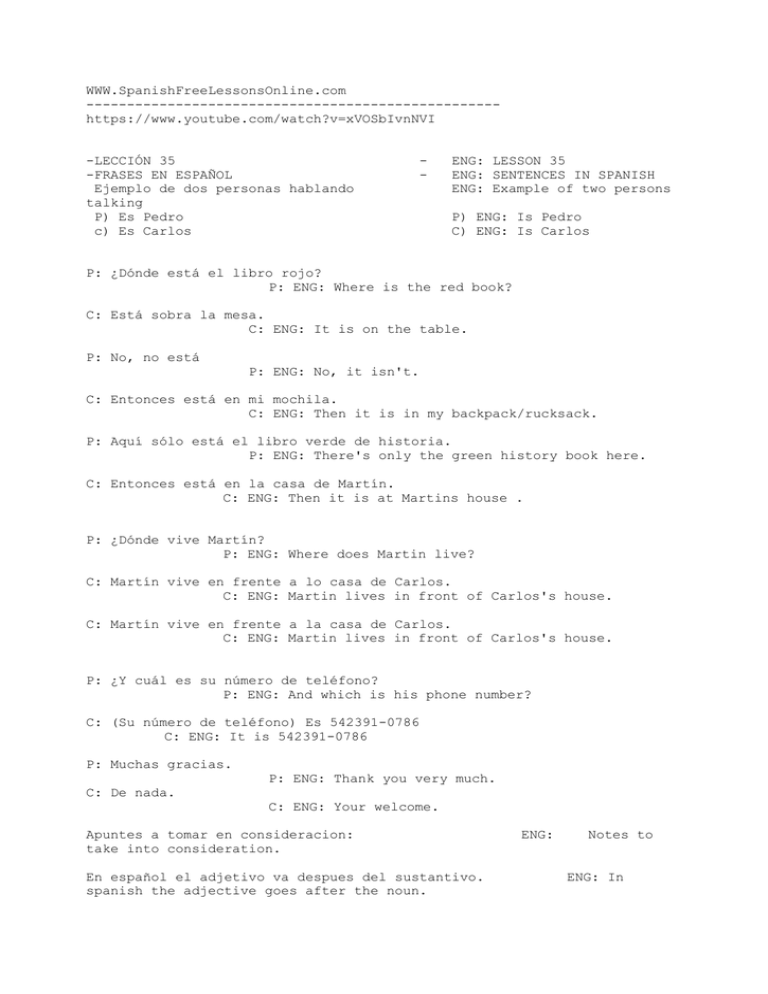
WWW.SpanishFreeLessonsOnline.com --------------------------------------------------https://www.youtube.com/watch?v=xVOSbIvnNVI -LECCIÓN 35 -FRASES EN ESPAÑOL Ejemplo de dos personas hablando talking P) Es Pedro c) Es Carlos - ENG: LESSON 35 ENG: SENTENCES IN SPANISH ENG: Example of two persons P) ENG: Is Pedro C) ENG: Is Carlos P: ¿Dónde está el libro rojo? P: ENG: Where is the red book? C: Está sobra la mesa. C: ENG: It is on the table. P: No, no está P: ENG: No, it isn't. C: Entonces está en mi mochila. C: ENG: Then it is in my backpack/rucksack. P: Aquí sólo está el libro verde de historia. P: ENG: There's only the green history book here. C: Entonces está en la casa de Martín. C: ENG: Then it is at Martins house . P: ¿Dónde vive Martín? P: ENG: Where does Martin live? C: Martín vive en frente a lo casa de Carlos. C: ENG: Martin lives in front of Carlos's house. C: Martín vive en frente a la casa de Carlos. C: ENG: Martin lives in front of Carlos's house. P: ¿Y cuál es su número de teléfono? P: ENG: And which is his phone number? C: (Su número de teléfono) Es 542391-0786 C: ENG: It is 542391-0786 P: Muchas gracias. P: ENG: Thank you very much. C: De nada. C: ENG: Your welcome. Apuntes a tomar en consideracion: take into consideration. En español el adjetivo va despues del sustantivo. spanish the adjective goes after the noun. ENG: Notes to ENG: In EJEMPLO: Aquí está el libro verde de historia. EXAMPLE: Here is the green history book. "LIBRO" "VERDE" "HISTORIA" - SUSTANTIVO ADJETIVO ADJETIVO ENG: ENG: "BOOK" - noun ENG: "GREEN" - Adjective ENG: "HISTORY" - Adjective NOTES: ___________________________________________________________ LECCIÓN 36 MAYOR Y MENOR Mayor ENG: Menor más grande ENG: más chico ENG: menos interesante menos aburrido El/la mayor ENG: El/la menor ENG: El más grande El más chico El menos interesante El menos aburrido ENG: LESSON 36 ENG: Bigger/greater and smaller bigger/greater ENG: smaller/ younger more big/bigger more small/ smaller ( also pequeño ) ENG: less interesting ENG: less boring the biggest the smallest ENG: the most big ENG: the most small ENG: the least interesting ENG: the least boring NOTES: _____________________________________________________ LECCIÓN 37 MÁS GRANDE Lo más grande Lo más chico Lo más interesante Lo más aburrido Lo mejor Lo peor Mejor Peor El/La mejor El/La peor Los/Las mejores Los/Las peores ENG: LESSON 37 ENG: Most big ENG: ENG: ENG: ENG: ENG: ENG: the "most big" of all. ENG: the "most small" of all. ENG: the most interesting of all. ENG: the most boring of all. the best of all. ENG: the worst of all. better worse the best the worst ENG: the best ( plural ) ENG: the worst ( plural ) NOTES: _______________________________________________ LECCIÓN 38 MÁS GRANDE Lo más grande Lo más chico Lo más interesante ENG: LESSON 38 ENG: Most big ENG: the "most big" of all ENG: the "most small" of all ENG: the most interesting of all Lo más aburrido Lo mejor Lo peor Mejor Peor El/La mejor El/La peor Los/Las mejores Los/Las Peores ENG: the most boring of all ENG: the best of all ENG: the worst of all ENG: better ENG: worse ENG: the best ENG: the worst ENG: the best ( plural ) ENG: the worst ( plural ) NOTES: _______________________________________________ LECCIÓN 39 LO MÁS GRANDE Lo Lo Lo Lo Lo Lo Lo Lo más grande más chico más lindo más feo mayor menor mejor peor ENG: LESSON 39 ENG: Most big ENG: ENG: ENG: ENG: ENG: the "most big" (of all) ENG: the "most small" of all ENG: the most beautiful of all the most ugly of all the biggest/oldest of all the smallest/youngest of all the best ENG: The worst chico is small and boy. Pequeño is also small. NOTES: ____________________________________________________________ LECCIÓN 40 MAYOR Y MENOR ENG: LESSON 40 ENG: BIG AND SMALL El padre es mayor que la hija. daughter. ENG: The father is older then the Pero el abuelo es el mayor. oldest. ENG: But the grandfather is the Y el bebé es el menor. ENG: And the baby is the youngest. Este reloj es mejor que aquél. that one. ENG: The watch is better then Pero el reloj suizo de Carlos es el mejor ( de todos ). Carlos' Swiss watch is the best of all. Lo mejor (de todo) es dormir. sleep. ENG: ENG: But The best of all is to Lo peor que me paso ayer fue perder las llaves. ( past tense ) ENG: The worst that happend to me yesterday is to loose the keys. El auto de Juan es mayor que el mio. Juan's is bigger then mine. ENG: The car of Pero la camioneta de José es la más grande. of José's is the most big. ENG: But the van Pero también es la menos bonita. the least nice. ENG: But also it is Estudiar es aburrido pero lo más aburrido es no hacer nada. Studying is boring, but the most boring of all is doing nothing. ENG: NOTES: ______________________________________________________________________ LECCIÓN 41 CUÁNDO Y CUANDO ENG: LESSON 41 ENG: WHEN? and WHEN ¿Cuándo almorzaremos? ( future tense ) lunch? Cuando sea mediodia. ENG: When will we have ENG: When it is noon. ¿Cuándo vendrá papá? come. ( future tense ) Cuando salga del trabajo. leaves work. ENG: When will dad ( future tense ) ENG: When he ¿Cuándo saldremos? ENG: When will we go out. Cuando pare de llover. ENG: When it stops raining. ¿Cuándo podremos comer? ENG: When can we eat? Cuando la comida esté pronta. ready. ENG: When the food is NOTES: _________________________________________________________________ LECCIÓN 42 VERBO HACER Simple present tense ENG: LESSON 42 ENG: to do/ to make - slightly irregular Yo-Go verb. yo hago tú haces usted hace él/ella hace nosotros hacemos vosotros hacéis ustedes hacen ellos/ellas hacen ENG: I do / make ENG: you do / make (informal ) ENG: you do / make ( formal ) ENG: he/she does / makes ENG: we do / make ENG: You all do / make ENG: you all do / make ENG: they do / make NOTES: _____________________________________________________________ LECCIÓN 43 VERBO HACER 2 Simple present tense - ENG: LESSON 43 ENG: to do/ to make slightly irregular Yo-Go verb. Yo hago arroz. ENG: I make rice. Tú haces trampas. ) ENG: You are cheating. ( informal Usted hace trampas. ENG: You are cheating. ( formal ) Él/ella hace trizas el papel. ENG: He tears the paper. Nosotros hacemos bien las cosas. ENG: We do things well. Vosotros hacéis vuestra tarea. ENG: You all do your tasks. Ustedes hacen lío en todos partes. everywhere. ENG: You all make a mess Ellos/ellas hacen las paces. ENG: They make peace. NOTES: _____________________________________________________________ LECCIÓN 44 PRONOMBRES POSESIVOS ENG: LESSON 44 ENG: Possessive pronouns Éste es mi gato. ENG: This is my cat. Ésta es tu casa. ENG: This is my house. Éste es su esposo. ENG: This is her/his husband. Ésta es nuestra universidad. ENG: This is our university. Aquélla es vuestra escuela. school. ( Spain ) Ésa es la excuela de ustedes. plural ) Ésta es su maestra. female ) ENG: That is your ( plural ) ENG: That is your school. ENG: This is their teacher. NOTES: ____________________________________________________ LECCIÓN 45 LAS CUATRO ESTACIONES ENG: LESSON 45 ENG: THE FOUR SEASONS ( ( Estación ENG: season Verano Caluroso Seco? Lluviso? ENG: Summer ENG: Hot ENG: Dry ENG: Rainy Otoño Colorido Ventoso ENG: Autumn/fall ENG: colorful ENG: Windy Invierno Frío Triste Gris Lluvioso ENG: winter ENG: cold ENG: Sad ENG: Gray ENG: rainy Primavera Florido/a Alegre Ventoso/a ENG: spring ENG: blooming ( flowers ) ENG: joyful ENG: windy NOTES: ___________________________________________________ LECCIÓN 46 PARTE 1 ADJETIVOS Y OPUESTOS Bueno Malo Lindo Feo Grande Chico Frío Caliente Rico Pobre Claro Oscuro ENG: LESSON 46 Part 1 ENG: Ajectives and opposites. ENG: Good ENG: bad ENG: Beautiful/nice ENG: Ugly / awful ENG: big ENG: small ( also Pequeño is small ) ENG: cold ENG: Hot ENG: rich ( also "tasty" for food ) ENG: Poor ENG: Light. ( claro can mean "of course" ) ENG: dark NOTES: ______________________________________________________________________ LECCIÓN 46 PARTE 2 ADJETIVOS Y OPUESTOS ENG: LESSON 46 Part 2 ENG: Ajectives and opposites. Adjectives match nouns in number and gender. Bueno - bueno, buena, buenos, buenas Malo - malo, mala, malos, malas Lindo - lindo, linda, lindos, lindas Feo - feo, Grande fea, feos, feas - grande, grande, grandes, grandes Chico - chico, chica, chicos, chicas Frío - frío, fría, fríos, frías Caliente - caliente, caliente, calientes, calientes Rico - rico, rica, ricos, ricas Pobre - pobre, pobre, pobres, pobres Claro - claro clara, claros, claras Oscuro - oscuro, oscura, oscuros, oscuras NOTES: ______________________________________________________________________
